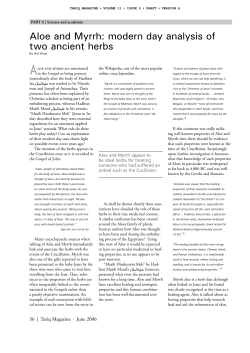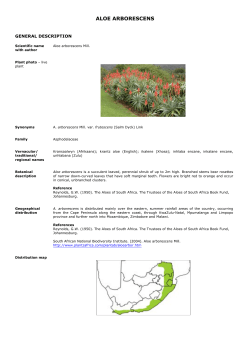
PAGE 8
PAGE 8 www. mountainecho.co.za Aloe maculate Whew, it’s been an unusually hot dry February so far – day after glorious day of sunshine! While the bulb may be nature’s perfect answer to turbulence and conditions above ground, the succulent is how best to deal with heat and lack of water!! And GIANT’S CUP CAFÉ & CRAFTS Lovingly stocked with quality, fairly priced novel crafts & gifts for whole family. Honey, cheese , trout, our own organic homemade fare - rich icecream, yoghurt, farm milk, jams, Simone’s chocolate almond treats, Fair Trade coffee,chocolate & tea. We support small crafters. Breakfast, light lunches, cakes. Nature trail. Good cycle stop off. Cows hand-milked at 3pm. Open 7.30am - 5pm daily. SANI PASS ROAD 0337020330 INDIGENOUS PLANT SALES :Choose from a range of tree and shrub species. Information provided and orders taken. Russell Suchet 0839873071 CELL 0824938700 mountainecho@telkomsa.net – the common soap aloe one of the iconic succulent families are the aloes which store water in their fleshy leaves and never seem to wilt no matter how hot or how dry (mind you, they do suffer in severe frosts!) They also protect themselves against animals seeking their life-giving fluid by having a serious set of thorns on their leaves! Cunning indeed! Further north in the Drakensberg, from the Vergelegen valley northwards, you will find large “tree-like” aloes covering the slopes (usually the north-facing slopes). These are Aloe ferox and they fit our stereotypical picture of an aloe. They are fairly tough, but just not quite tough enough to live out in the open on our southern Berg slopes, that slightly lower temperature due to being that tiny bit further south prevents them from becoming established here. They can be grown in gardens though, as long as you can find them a reasonably protected, sunny spot. Bob Mulder had a wonderful tall specimen under the eaves of his workshop in Underberg! The small Aloe maculata, however, is a different story. It also struggles to tolerate serious frosts, but is found commonly in the southern Berg. It avoids frosts by growing on quite steep and often rocky slopes where the danger of heavy frost is reduced. It is a “ground” aloe, and therefore doesn’t grow very tall. They can remain very small in diameter in poor conditions, but given a favourable location in a protected spot in your garden, they can grow to a diameter of 1m. It will grow well in gardens and even if frosted, usually grows back from the roots. It flowers any time between July and October – those specimens sending out late flowers are usually more successful as early flowering heads are often destroyed by frost even if the aloe itself is not. It sends out a flowering stalk, as do most aloes, with branches of lovely red flowers. Surviving flower heads are much loved by sunbirds and will form packets of seed if left alone after pollination. A garden location giving some protection, such as in full sun against a wall or rock feature is a good idea. They do also reproduce vegetatively, so if your aloe is happy, you’ll have a whole clump of them over a few years! Aloe maculatas and over 30 other species of indigenous trees and shrubs are available from Indigenous Plant Sales at the Giants Cup Café, 10km on the Sani Pass road. Open daily 7.30am to 5pm. Enjoy a coffee and delicious scones with homemade jam and fresh farm cream while you read our information booklet and decide which plants your garden needs. Our FEBRUARY/MARCH 2015 brand new Greenhouse is nearing completion and this will allow us more space and better viewing of a larger selection of plants. You can also see what is on offer on our new webpage at www.sanilodge.co.za and click on the “Indigenous Plants” link. We will be sending out newsletter emails periodically about what is new and available, so drop us an email at info@sanilodge.co.za if you wish to join the mailing list. Sani Wildflower Walk The annual wild flower walk took place on 25th January. The landslide which occurred shortly before this event meant that it would be very difficult to get people to the top of the Pass for their walk down. Everyone who had booked was given the option to go to the Look Out point on the Pass and walk down from there. Confusion reigned as Giant’s Cup Lodge computer was down and the bookings were being taken between Derick our treasurer and Scholar from Russell’s, because Russell and Simone had to be away taking their son to the Cape to university. Dear Alta Small who had done all the bookings for years came to the rescue, and between Scholar and Alta all was well. Bill Small and Alta had run this project for Sani Wildlife for years and once again thanks to Bill and Alta the day turned out without too many snags!!! Aldo Berruti whose input on the botany side said the flowers were’nt very great. But it seems the day was enjoyed by all who went on the walk. Garden Club Talk on Herbs 18 March The Himeville/ Underberg Garden Club will meet on Wednesday 18th March 2015, at” Cedar Gardens‘the home of Monica & Norman Herring. Look out for the Garden sign on the main road from Underberg to Himeville. Cedar Gardens is in Polo Way, Underberg. The guest speaker is Karin Makin of Petersgate Herbs.Karin has a wonderful knowledge of herbs. She will be speaking on growing of Herbs and their cosmetic, medicinal, culinary and organic uses.There will be a range of Herbs for sale. Bring chairs and hats for a lovely morning. Meetings start promptly at 10am. GARDENING TIPS FOR THE SOUTHERN plant into trays of peatmoss and sand. Keep DRAKENSBERG FEBRUARY Cut back your rambling roses because they are over now. It is time to plant strawberries into a mixture of lime, compost, manure and bone meal. Winter flowering seed can be planted now, these include pansies, violas, antirrhinums, stocks, calenduals, phlox and poppies. It is time to top dress your lawns with 2:3:2 (22) to build up roots for the winter cold. Cut back all perennials like shasta daisies, michaelmas daisies and achillea. Dig sweetpea trenches in a north facing aspect about 50cm deep, then mix the topsoil with manure, bonemeal, compost and 2:3:4: and put back into the trench. Soak your sweetpeas seed overnight and then plant the next day and remember to sprinkle snail bait on top. Veggies that can be planted at this time of the year are carrots, cabbage, brocolli, cauliflowers and brussel sprouts. MARCH Scatter namaqualand daisy seed now in full sun in a north facing bed. Cut back Pride of India hard if you want compact shrubs. Take cuttings of impatiens, begonias and root in sandy soil then keep in a sheltered place. Camellias, azaleas and rhododendrons are in bud now so you need to mulch now and water well. You can plant Iceland poppies, calendula, stocks and larkspur seed now and pansy and violas plants now. Primula malacoides should be coming up in a thick mass. Cut squares with a sharp knife and them damp and when large enough plant them out. Vegetables to plant now are cabbages, cauliflower, broccoli, broad beans, brussel sprouts and spinach. (Excerpts from Wendy Tarboton’s Garden Guide for the Southern Drakensberg printed in 2006) Guy Wiggill was inducted as Chairman of Sani Round table for 2015. Photo: Rowena Aldous www,rowenaaldous.co.za Himeville 61 Arbuckle Street 033 702-1019 himeville@tyresandmore.com should we not have stock we can source it within 24 hours or less in case of emergency
© Copyright 2025












